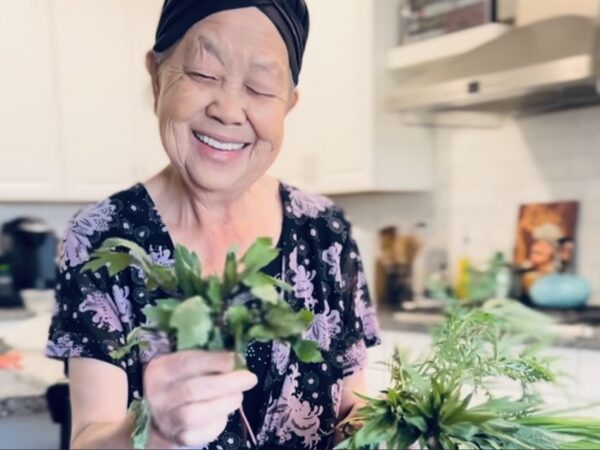by Yia Vang
I finished the first draft of my cookbook memoir. Writing about Mom and her food was a coming back home to myself and to the parts of myself that I had cast aside. The fractured parts of my soul that had been lost and neglected were picked back up and loved, in the same way a shaman would hu nplig in a ceremony to call your soul to come back home.
When I set out to work on my book, I thought it was going to be about the reconciliation of my American life with my Hmong life, but as I kept typing, the keys on my laptop outlined the shape of Mom’s history and filled in the blank pockets of my heart with the sound of a little naked girl wearing only a black hemp shirt laughing and running around playing ‘snake chasing its tail’ with her friends. My own youth started to make sense as Mom walked me through her mom teaching her the intricate process of making indigo dye into batik printed fabric. The soft contours of my hands pressed up against her calloused, diligent hands toiling the earth and harvesting corn and opium poppies. My nose woke up to the scent of chicken soup with medicinal herbs and my tongue remembered once again Dad’s favorite dish of fermented sweet rice drenched in plum wine syrup. The book had a life of its own that wanted to be revealed.
It’s interesting how our parents are just our parents, and it’s often hard to imagine what kind of life they had beyond being a parent. Growing up, Mom’s identity, her life for me began from my earliest memory of her chiding at me when, at 4 or 5 years old, I climbed on a countertop and reached in the cupboard and accidentally tipped over a bowl of pepper flakes into my and my nephew’s eyes. While my eyes were burning and I was crying in pain, Mom and the adults around us yelled at me for being naughty– doing this to myself and my nephew. That was how I knew her, always disapproving and barking orders, telling me I’m lazy and can’t cook a meal for her. But as I listened to her stories, Mom was no longer a mom. That identity dissolved into a young girl named Ntxawm, the seventh daughter, and youngest, of a father who was a shaman and a mother who passed our lineage to her through food, farming, and needlework.
I learned that Ntxawm was brave and courageous beyond anything I would ever experience. She went from being a young girl and having to flee her village in the middle of the night while communist soldiers came to hunt them down, to being forced to marry a widower with eight children who was old enough to be her father where every day she had to tell herself to stay just one more day, to coming to America with six of her own children and nothing more than the clothes on her back and the handful of silver jewelry and sewing basket with her batik Tjanting tools that belonged to her mother, to being the smartest student in her English class who had to stop going to class when her husband told her to stay home and care for the children.
In the last two years of going home to visit Mom, eating her food, learning to make her dishes, and listening to her stories, she became a woman, and one I deeply respect for her passion, strength, love, stubbornness, and fierceness.
She taught me many things, one of them being that love is an act of becoming. Love isn’t something you can demand from others nor is it something you have to change yourself to get. As I became curious about who she was, Mom started to reveal herself and it had less to do with Mom changing than it did with my own heart breaking down over time. Mom went from being a disciplining mother, to one I was ashamed of, to a Mom I blamed for the pains of my life, to a woman who I continue to discover, delighting in the depths and complexity of her thoughts and emotions, and who I now recognize has always been driven by only one thing: love. I have learned that our relationship has allowed me to evolve into being love. Instead of looking for love from her, I was being made into love, and in turn became able to reflect love back to her.
Now, I’m working on the second draft of the book, all fifteen chapters, taking a deeper dive into the nuances of Mom’s story, sewing together the different parts of her life, and revealing in the next layer of my soulmaking.

 Get access to the monthly Rehumanization Magazine featuring contributors from the front lines of this effort—those living on Death Row, residents of the largest women’s prison in the world, renowned ecologists, the food insecure, and veteran correctional officers alike.
Get access to the monthly Rehumanization Magazine featuring contributors from the front lines of this effort—those living on Death Row, residents of the largest women’s prison in the world, renowned ecologists, the food insecure, and veteran correctional officers alike.